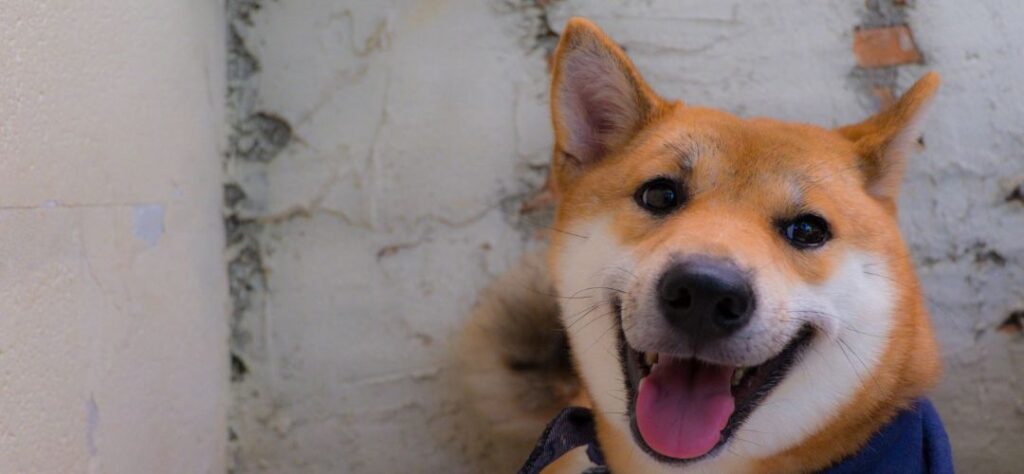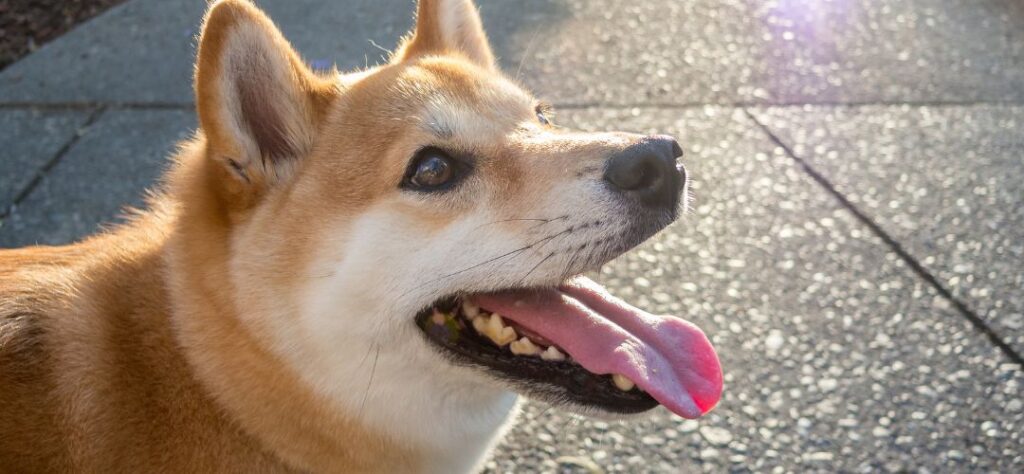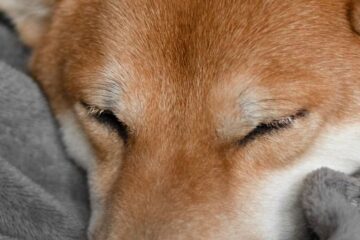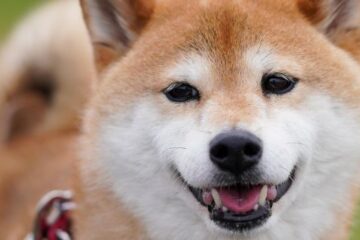If you know anything about this breed of dog, then you have likely heard the common saying that they are “barking machines”. But is this really true? Do Shiba Inus bark more than other breeds? Let’s take a closer look at these cute and cuddly canines to find out how often they really bark.
Shiba Inu’s are usually known as being quite vocal. They have an impressive bark that can often be heard, especially when they sense danger or want attention. This loudness and tendency to bark can make them seem like they are always “on the alert”, so it is no surprise that many people assume that Shiba Inus always bark a lot.
However, this isn’t always the case. In fact, Shiba Inus can actually be quite quiet – particularly when they are relaxed and content. They rarely bark if there is nothing to alert them or draw their attention. As long as you provide them with a calm environment, it is not uncommon for these dogs to remain relatively quiet and well-mannered.
Overall, while Shiba Inus may bark more frequently than some other breeds, this does not necessarily make them “barking machines”. With proper training and socialization, these dogs can learn to only bark when necessary. This makes them great companions for those who want a loyal friend with a distinct voice!

Why is my Shiba Inu not barking?
If your Shiba Inu is not barking, there could be a few reasons for this. It could be that they are feeling comfortable in their environment and do not feel any need to alert you of anything. Alternatively, it is possible that they may require some additional training or socialization in order to learn how and when to bark properly.
When it comes to teaching your Shiba Inu when it is appropriate to bark, positive reinforcement and consistency are key. Make sure you reward them with treats and praises whenever they respond properly to your commands or stay quiet when necessary. It may also be a good idea to practice barking in controlled situations, such as when someone knocks on the door or rings the doorbell. This will help your Shiba Inu learn when and how to bark in the appropriate situations.
By providing your Shiba Inu with the right training and socialization, you can help ensure they know exactly when it is time for them to make some noise – and when it’s time to remain quiet. Ultimately, this will help create a much more peaceful living environment for all.
When it comes to training your Shiba Inu, it’s important to remember that patience is key. Training should be a fun and positive experience for both you and your pup, so make sure to take things slowly and gradually build up the difficulty level as they learn! With a bit of time and effort, you’ll soon have a loyal companion who knows exactly when to bark — and when it’s time for some peace and quiet.
Overall, when it comes to teaching your Shiba Inu how and when to bark, the best approach is one of patience, consistency, and positive reinforcement. With a bit of practice and dedication, you can help ensure that your pup is barking at the right time and in the appropriate situations.
And while it is important to remember that all dogs will bark from time to time, understanding your Shiba Inu’s individual personality and tendencies can help you better prepare them for when it is ok – and not ok – to make some noise. After all, a well-trained pup is a happy pup!
Why does my Shiba keep barking?
It’s normal for a Shiba Inu to bark — after all, it is their natural way of communicating! However, if your pup’s vocalizations are starting to become excessive or disruptive, then you may need to take some extra steps in order to address the problem.
There can be many reasons why a Shiba might bark too frequently or too loudly. Some of the most common include boredom, fear or anxiety, territorial behavior, and even excitement — particularly when it comes to greeting someone new. It’s important to take these potential causes into consideration before trying to address your pup’s barking habits.
In some cases, a simple distraction may be all that is needed to help your pup calm down and stop barking. This could include offering them a chew toy, taking them for a walk, or simply giving them some extra attention and love. However, if the issue persists, you may want to consult with a professional dog trainer who can help you identify the underlying cause of the behavior — as well as provide helpful strategies on how to address it.
In addition, there are numerous products out there that can help reduce barking. These range from anti-barking collars to sound-activated devices which emit a high-pitched noise whenever your pup starts barking at an inappropriate time. Of course, no matter what product you choose to use, make sure to keep safety in mind and always observe your pup for signs of distress.
At the end of the day, it’s important to remember that barking is a natural behavior for Shiba Inus — as long as they aren’t becoming disruptive or causing harm to their environment. Taking some extra measures to ensure your pup is being heard at the right time can be beneficial in many ways. So try to keep an open mind and take the time to understand the root of your pup’s behavior before coming up with a solution.
Why is my Shiba so vocal?
Shiba Inus are known for their vocal tendencies. They tend to use barking, whining, and howling as a way to communicate with their owners and other dogs around them. It’s important to note that this vocal behavior is normal — but it can be concerning if your pup is constantly barking or howling for no apparent reason.
The most common causes of excessive barking and vocalizations are boredom, anxiety, fear or frustration. If your Shiba Inus is feeling bored, frustrated or anxious, they may bark to get attention or simply to let out their pent-up energy. It’s important to acknowledge the underlying cause of this behavior and take appropriate action to address it.
To help reduce your Shiba’s vocal behaviors, it’s important to provide them with plenty of physical and mental stimulation. This can include pleasant activities such as long walks, interactive play or even obedience training — all of which help keep your pup mentally engaged and physically active. If boredom is the root cause, providing more enrichment activities or introducing new toys may also be beneficial.
For more anxiety-related barking, it can help to create a safe and comfortable environment for your pup — this may include providing them with more hiding spots or introducing calming techniques such as classical music or pheromone therapy. Additionally, you should avoid harshly punishing your dog for excessive vocalization and instead work on building trust and rewarding calm behaviors.
Why do Shibas growl when you pet them?
Growling is a normal behavior for all dogs, including Shiba Inus. It’s important to note that growling isn’t necessarily a warning sign, but rather an indication of discomfort or insecurity. This can be due to anything from fear of being touched in certain areas to feeling overwhelmed by too much petting.
In order to determine why your Shiba might be growling, it’s essential to pay attention to their body language and take note of the context in which they are growling. If they start growling when you pet them around their neck or shoulders, this could be an indication that they don’t like being touched in those areas. Similarly, if they’re growling while you’re petting them for too long, this could mean that they feel overwhelmed and need some time alone.
In either case, the most important thing is to make sure you respect your Shiba’s wishes and stop what you are doing. If they don’t like certain areas being petted, give them a break and try again at another time. You should also avoid chasing or cornering your pup if they’re trying to leave the area.
It is important to be consistent when it comes to petting—and all interactions with your Shiba Inu in general—so that they can learn what behaviors are expected of them. You should also practice positive reinforcement to reward calm, non-growling behavior. This will help your pup learn to associate good things with being petted and hopefully reduce growling in the future.
Finally, make sure you give your Shiba Inu plenty of time and space away from people. While it’s important for them to bond with their humans, they also need time to decompress and relax on their own. This will ensure that your pup is happy and content with the amount of attention they’re receiving from you!
Is it normal for my Shiba Inu to bark at strangers?
It is not uncommon for Shiba Inus to bark at strangers, especially when they are unfamiliar with the person or feel threatened. This is a natural instinct and can vary from mild barking to more aggressive growls or barks. It’s important to take note of the context in which they are barking: if your pup is in an environment where they feel uncomfortable or threatened, they may bark more aggressively.
When your pup is barking at new people, it’s important to remain calm and take steps to keep the situation from escalating. If you can, lead your pup away from the source of their discomfort until they have calmed down. It’s also useful to provide treats or a toy as a distraction and reward them for remaining calm.
It’s also important to socialize your pup early on so that they can become accustomed to new people. Introducing them cautiously in controlled environments with positive reinforcement will help your pup learn that strangers are not a threat. If you continue to expose them to different scenarios—new people, places, and sounds—they will better understand it’s okay to remain calm in these situations.
When you do take your pup out, make sure you are keeping them on a leash and that they are wearing an ID tag. This will not only help keep them safe but also ensure that if they accidentally wander off, they can be returned safely. Lastly, don’t forget to reward your pup after a successful outing!
In short, it’s important to be aware that barking at strangers is natural for Shiba Inus but that doesn’t mean it should be ignored or tolerated. Taking the proper steps to socialize and train them will help prevent future incidents and ensure your pup can safely interact with new people in the future.
When it comes to barks, Shiba Inus have a variety of sounds in their repertoire. From the “talkative” yodel-like howl to the deep warning bark, they can express themselves clearly when it matters most. Whether you’re out for a walk or simply relaxing at home, these pups know how to communicate—and put on a show for their owners too!
So if your Shiba Inu is about to let out a bark, don’t be alarmed! They’re simply doing what comes naturally and are quite capable of controlling themselves in the right environment. All you have to do is make sure your pup has plenty of chances to socialize and get comfortable in new environments.
At the end of the day, how often Shiba Inus bark is all up to their owners! With a little bit of patience and positive reinforcement, any pup can learn when it’s okay (and not okay) to let out a bark. So don’t be discouraged—you can always make sure your pup barks responsibly.

How do I stop my Shiba Inu from barking too much?
If your Shiba Inu has taken too much of a liking to barking, it can be difficult to know how to get them back under control. Fortunately, there are some measures you can take in order to effectively curb excessive barking behaviors without needing to resort to extreme tactics such as shock collars.
The first thing you should do is identify what triggers your pup’s barking. Does it occur when a stranger walks by? When the mailman delivers letters? Once you understand exactly why they are barking, it can be easier to address this behavior and work on a resolution.
Make sure you provide enough exercise for your Shiba Inu. A lack of physical activity can lead to boredom and an excess of energy. This can cause them to bark more often in an attempt to communicate their needs and grab your attention.
Provide plenty of mental stimulation as well. If you notice that your pup is barking out of boredom, plan activities such as brain games or interactive toys to keep their mind occupied and engaged. This takes the focus away from barking and encourages positive behaviors.
When it’s time to correct your pup’s behavior, use a firm voice and gentle physical restraints to let them know that their barking is inappropriate. Redirecting their attention to a toy or treat can help them associate positive actions with the situation.
Finally, reward your pup when they demonstrate good behavior. Providing treats and giving lots of praise can help reinforce the desired behavior and stop them from barking excessively.
By taking proactive steps, you can reduce your Shiba Inu’s barking habits and create a calmer environment everyone can enjoy. With patience and plenty of positive reinforcement, it won’t be long before your puppy is back to being their quiet, obedient self again!
Conclusion | How often do Shiba Inus bark?
This article provides helpful tips on how to reduce the barking of Shiba Inus. It suggests identifying what triggers their barking, providing them with sufficient exercise and mental stimulation, correcting bad behaviors with firmness and gentle physical restraints, and rewarding good behavior with treats and praise. With patience and guidance, owners can help their pup learn not to bark excessively.


